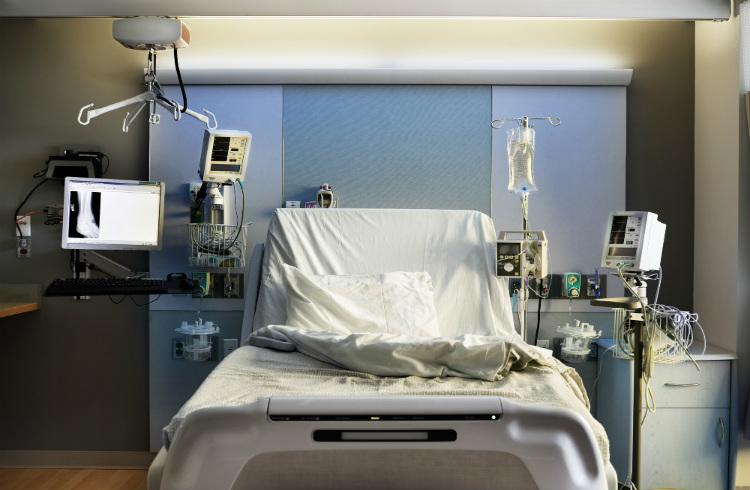How to Choose the Best Hospital When Traveling Overseas
Coronavirus (COVID-19) and travel: The situation around the world is changing dramatically. Various governments have changed their travel warnings to restrict travel during this time. To understand how this may impact cover under your policy, please go to our FAQs and select your country of residence.
For the latest travel warnings and alerts around the world, read about lockdowns and border restrictions.
How do you know a foreign hospital is safe? Will you be getting quality care for your injury or illness? We show you what to look for in a hospital when you're traveling.
Shares
 Photo © GettyImages/Ryan McVay
Photo © GettyImages/Ryan McVay
You thought that the lunch you ate smelt funny? Unfortunately, that thought is two hours too late, and now you're curled up in the toilet, inventing a new guttural language.
Suddenly, a new fear strikes you; you're in a foreign country, alone, and you need a hospital.
What do you need to know? What should you look out for? Here are nine tips our experts recommend when choosing the right hospital.
- Choosing the Best Hospital
- Tell Your Travel Insurer
- Standards of Medical Care
- Private vs Public Hospitals
- Is the Hospital Clean?
- Ask Questions
- Give the Right Information
- Take a First Aid Kit
- Use Your Common Sense
1. Choosing the best hospital
If you're being admitted as an emergency, or taken by ambulance, you often won't have much choice in where you go. However, if you can exercise choice, it's important to select the best hospital for you – does it have the right services (eg a CT scanner), is it clean, can the staff speak your language, etc?
2. Tell your travel insurer
Let your insurer know you have been admitted as soon as possible, to ensure you are covered for all treatments you receive. If you can let them know before you get to the hospital, they may be able to point you to the best facility in town.
3. Standards of medical care
Hospitals don't have the same standards of care everywhere. Depending on which country you are in, and whether you are in a big city or in a rural area, hospitals can differ greatly. Many developed countries will have a government regulation committee that will inspect all hospitals to make sure there is a minimum standard of care, while others may be completely unregulated.
Generally speaking, hospitals in developing countries have less regulation and lower standards than those in developed nations. Sub-saharan Africa is notorious for its underfunded and understaffed institutions, and parts of South America have poor legacies regarding the state of healthcare. However, Southeast Asia and the Indian subcontinent have some of the best hospitals in the world; it's all a matter of choosing the right place.
4. Private vs public hospitals
Private hospitals are generally as good as public hospitals and, in many places, often better. Private hospitals tend to have better funding and can, therefore, afford better equipment and facilities. You may also have a better chance of finding medical staff who speak English.
Public hospitals may offer a range of services that private ones don't, including intensive care units, emergency cardiac interventions, and a wider range of staff for paramedical services such as physiotherapy and radiology.
5. Is the hospital clean?
As a general rule of thumb, cleanliness is a good indicator of the level of safety in a hospital. Word of mouth is also a good way of gauging a hospital's reputation. If you are covered by a reliable insurer, its emergency assistance teams should have the experience and knowledge of quality hospitals globally.
6. Ask questions
Don't be afraid to ask questions that may seem difficult – it's important that you know what is happening to you, and instead of being offended, medical staff have a duty of care to ensure you are kept up to speed with what's going on.
7. Give the right information
You will be asked for your demographic details (age, gender, next of kin etc) and your medical history. It's a good idea to carry a list of previous operations, illnesses
8. Take a first aid kit
An emergency medical kit always comes in handy, but what you can do with one is limited. Kits should ideally contain basic painkillers, antiseptic, anti-diarrhea and rehydration preparations, bandages and plasters. Customs and prescription laws restrict the amount you can carry around with you.
For any worrying conditions, it's always best to seek expert medical advice – things can be picked up before they develop into major problems and sometimes you need a doctor to give you medications you cannot otherwise access.
If you take any medications, eg insulin, it's essential to keep an adequate supply and to keep stores in two separate bags in case one is lost. Also, if you are anaphylactic, don't forget to take adrenaline with you, and give your traveling companion instructions on how to use it. Always carry a doctor's letter to outline what medications you are taking, dosage and medical reason.
9. Use your common sense
The biggest problems that travelers face are dehydration and gastro-related illnesses such as traveler's diarrhea while on the road. Avoiding these can be as easy as exercising some common sense health precautions.
Dehydration is easily counteracted by drinking plenty of clean water daily and if needed, electrolytes whether in a Gatorade or water-soluble form. Maintaining good personal hygiene is paramount when traveling and being vigilant about what you are choosing to eat and drink, the cleanliness of the place you are eating at whether a cafe or street food helps.
Make sure you're adequately medically insured so your bills are paid, and you'll have support to help you through your health crisis.
Get a travel insurance quote for Worldwide
You can buy at home or while traveling, and claim online from anywhere in the world. With 150+ adventure activities covered and 24/7 emergency assistance.
Related articles
Simple and flexible travel insurance
You can buy at home or while traveling, and claim online from anywhere in the world. With 150+ adventure activities covered and 24/7 emergency assistance.
Get a quote
2 Comments
As I've traveled the world, I've always wondered where I would go if there was a tragedy. After reading this article I feel more prepared to choose a hospital if I need one. If I'm going to be staying in an area for a long time I think I'll even go to local hospitals in person and check them out. I agree with you, cleanliness is the most important factor in choosing a hospital. http://www.pchsak.org/Peninsula-Community-Health-Center-
Good. Thanks for this information. When comes to Chittagong, you can go National Hospital Chattogram too. This is the link of the hospital.
https://nationalhospital.com.bd/best-hospital-in-chittagong